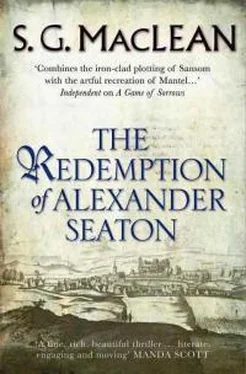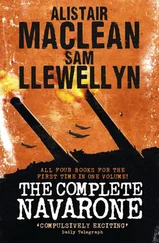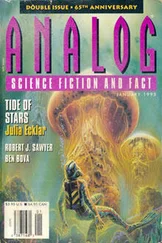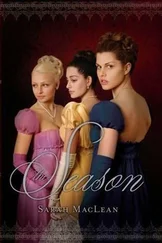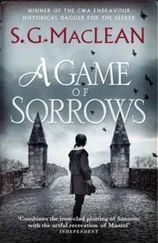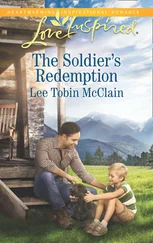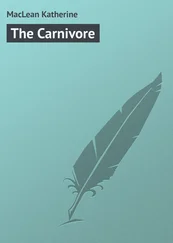I forced myself up once more and my eye caught sight of something glinting in the moonlight. I moved closer. I had not been deceived – it was glass, thick, old, weather-worn glass. I stooped down, thinking at first it must be a window pane the builders had mislaid. But it was not a window pane, set though it was in what had once been a solid wooden frame. Mastering my flailing hands, I slid the frame along on reluctant runners and there, beneath, the palest of blue in the pale moonlight, I saw the beauty of death, the slender, delicate blooms of the colchicum mortis . I stretched out my hand in wonder towards it. A branch cracked that was not beneath my foot; the rasping cough filled my ears. I spun round in time to see the sharp-boned features of Baillie William Buchan’s face bearing down on me, and the rock smashing towards my head.
FIFTEEN
Old Stories’ Endings
The vast frame of Thomas Stewart barred the door. Iron bars filled a solitary window high above me. There was no furnishing to the room, other than the trestle bed on which I lay. The walls and floor, both stone, were bare of any covering. It was daylight, but I could not tell what time of day it was: late morning, perhaps. I could not hear the sea. I tried to lift my head, but the burning stone inside it brought it crashing down once more upon the mattress. Thomas Stewart immediately shouted through a grille in the door for a guard. A man appeared, a message was given and the grille was slammed shut once more. Slowly, the notary turned to me. He came closer, searching my face for further presence of life. I opened my mouth in an attempt to speak, but little more than a croak emerged. He dipped a cup into a basin of water by the side of the bed and trickled some onto my lips. I swallowed, but the intense pain in my head overwhelmed any relief I had hoped for. I tried again. ‘The baillie?’ I asked.
‘He is here.’
‘And the provost?’ I managed.
The notary shook his head. ‘He has not been found. It was some time before the baillie was able to raise the alarm, and by the time messages were got to the town ports, Walter Watt was gone. He left by the Sandyhill Gate, riding hard. The men on the watch did not challenge him, for who would challenge the provost?’
One had, one man. Much of last night remained in some foggy recess of my mind I could not yet reach, and yet one thing I did remember: William Buchan had saved my life. I could see him still, lunging at the provost’s arm as Walter Watt aimed the sharp garden rock at my head. I could see him still, being thrown back by the stronger man. And then I saw him rise again, somehow, as Walter Watt lifted his hand a second time. Here my mind clouded over, and I could see no more.
‘Is he badly hurt?’ I asked.
‘He is bruised about the face, and his hand is badly gashed – he will admit to nothing else – but he might have fared much worse against such an opponent, were it not for the merciful Providence of the storm.’
‘The storm?’
‘Aye. The storm of the night Patrick Davidson died ripped branches from trees throughout the country. It was one such branch the baillie managed to lift and bring down upon the neck of the provost before he could strike you again. The provost somehow righted himself before the baillie could, and fled, but William Buchan would not go after him until he had seen that you lived, and stemmed your bleeding.’ He lowered his voice. ‘He could never have caught him anyway; he could scarce walk by the time he reached us to raise the alarm. But the garden, Alexander – how did you know?’
I looked towards the water and he trickled some more into my mouth. Less pain this time, greater relief. I could answer truthfully, at last. ‘Patrick Davidson told me.’
Before the notary could respond, the door behind him swung open slowly and there, between two guards, stood Baillie Buchan.
How could I put into words all that I had to say to him? I had scarcely the strength to speak, no more had he to hear. His face was sallower still, and his bones stood out as from a cold skull. ‘Thank you,’ I said.
He regarded me for a long hard minute and finally spoke. ‘Let the thanks be unto God. He has revealed the truth, and you have been His instrument. He has preserved you for His work, and it will be my great blessing to see it completed.’
‘When did you know?’ I asked.
The baillie was taken by one of his coughing fits, and Thomas Stewart called for a chair to be brought.
William Buchan waved the chair away and kept to his feet. ‘Eight years ago, I knew,’ he said. ‘And every day since, I have, on my knees, implored God that He would grant Helen justice in this world, as He himself will have judgement in the next.’
‘But why did you wait so long? Why did you not speak out before now? If you have indeed spoken out yet?’ I looked at Thomas Stewart, who by his eyes directed me back to the baillie.
‘I had not the proof; I had only the certainty of my own heart, my own mind. I could not accuse a man of such a thing on those grounds – the Devil lays many snares for those who are not watchful of their own weaknesses, and I knew mine. I had to wait and watch these eight years, and he never put a foot wrong. Until two weeks ago, when he plunged himself once more into the acts of darkness and I knew his day was approaching. But still there was no proof, and strive though I might, and did, I could find none. But I prayed also; I prayed that the Lord might aid me in my striving. And He did, with the discovery of Patrick Davidson’s maps; I knew then that I was to send for you. And when you came, and showed yourself not to have been corrupted by your failings, as men had thought, I knew that you were the man who could do what I could not. I had of times asked myself why God had given you such gifts, if they were only to be thrown away on the whim of your human failings. I had forgotten that our true calling is not always that which seems most likely to the eyes of men.’
‘I am not called to be a searcher out of murderers,’ I said coldly.
‘No,’ he replied, ‘but a searcher for the truth. Even from your youngest days, I had marked you out as a searcher for the truth.’
From my youngest days. His words took me back three days to that bare chamber of his, to the kist that lay on the floor, to the notes I had read as he and Charles slept, of my sermon at Boyndie kirk. What great hopes he had had for my ministry, what thanks he had given for my gifts. And what a mockery I had made of his faith in me. Now, in this moment, he was telling me that what I had done, he had not: where I had given myself up as lost to God’s plan in this world and His salvation in the next, he never had. I would never have believed that I could have felt warmth for William Buchan, or been desirous of being worthy of his praise, but I felt it now, humbled and honoured by the words of one I had so scorned.
He continued. ‘From the moment the provost chose to entrust you with the maps, I knew you would go where I could not, ask what I could not, find what I could not. So I watched you, and I had you watched, and followed.’
Now I understood, all those times when I had felt myself to be watched, fancied I had heard footsteps but seen no man behind me when I turned. ‘By Lang Geordie?’
For the first time in my life, I heard William Buchan laugh, a full, mirthful, delighted laugh. ‘Lang Geordie?’ he repeated, in disbelief. ‘No, Mr Seaton, I at least do not consort with thieves and idle beggars.’
‘Then who?’
‘It was me, Alexander,’ Thomas Stewart said softly, ‘it was me.’
My mind struggled to open doors on the last few days, on things I had not understood. I had known I was watched, but had never had an inkling of by whom. In Aberdeen, on the road from Straloch, even … ‘You, Thomas, it was you who followed me to Darkwater?’ I marvelled that the man had not stumbled to his death.
Читать дальше
